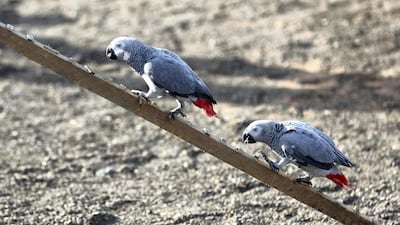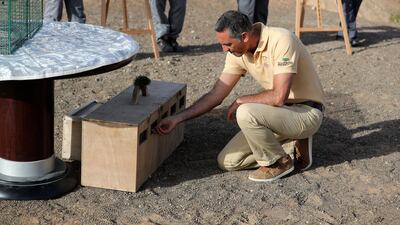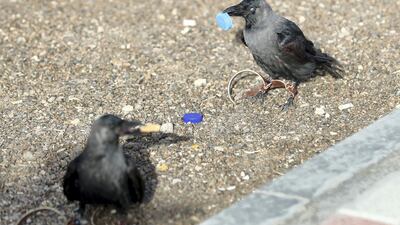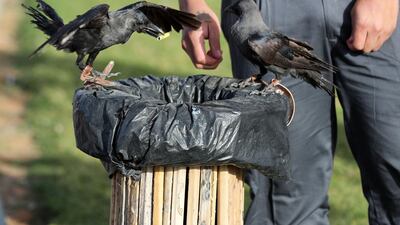A flying squad of litter-picking parrots and crows are encouraging UAE residents to clean up their act.
The feathered friends have been trained as rubbish collectors, ready to swoop in at any given moment to clear up litter blighting green spaces across Abu Dhabi.
Barari Natural Resources, which manages more than 400 forests and nature reserves across the capital, is using the birds to front its 'Nature Educates Us' campaign.
The birds will be appearing at public parks and reserves all over the city to demonstrate the importance of disposing of rubbish correctly.
The National got a closer look at the clean team in action at Al Hayer Park in Al Ain.
Germán Alonso Malo, the bird trainer who ensured the aerial helpers earned their wings, said it is a novel approach to solving a pressing issue.
"If a bird is able to pick up trash, why can't humans do the same thing?" he said.
Mr Alonso, from Spain, started training the birds in January of last year.
"We wanted to start with crows because they are very clever. But the problem was, in the beginning, we had no crows and we wanted to start as quickly as possible," Mr Alonso said.
“So we started with three parrots. They joke a lot and you'll see that they are a little bit like clowns but they also do a good job. But the crows, of course, are the better workers.”
Once the crow chicks were collected, they were added to the programme in April.
A bird's strongest sense is sight, which makes them able to find small pieces of plastic and cigarette butts easily.
"We started with butts and then we also put down plastic and little pieces of paper," Mr Alonso said.
His next task was to train the crows to be able to sort rubbish into different receptacles.
Though there are 25 birds in the training programme, only five crows and two parrots were deemed “clever” enough to participate in the demonstrations.
"You can see in a few seconds. If they are clever, it looks like they listen to you. And others turn around and look towards other things and don't concentrate. Or some of them are afraid," Mr Alonso said.
The other birds will be bred to create the next group of crows to be trained.
Mr Alonso said it was important for the birds to be intelligent so that they can adapt to new environments and challenges posed by other animals in the wide variety of parks they will visit for demonstrations.
As well as being unsightly, discarded rubbish can be harmful to the environment.
For example, cigarette butts, which are the most common form of litter on the planet, contain toxic chemicals that can stunt the growth of grass by 13 per cent.
Barari initially began considering adopting the idea in late 2018 after its chief executive, Ahmed Alblooki, was inspired by a similar initiative in France.
He asked Malik Rapaie, manager of Wildlife Conservation Services at Barari, whether such a scheme would be possible in the UAE.
Mr Rapaie said that there were several obstacles to implementing the same programme in the Emirates.
"We cannot have the same crow that they trained in France because that one is an indigenous local crow," he said.
Instead, they chose the Indian house crow, an invasive species found in Abu Dhabi near the mangroves.
Barari is currently working with the Department of Urban Planning and Municipalities to decide on a schedule of public demonstrations.
Mr Rapaie is hopeful the plan they hatched will pay off – for the good of the environment.
"There is really an issue here about littering rubbish in non-designated areas. All parks are really suffering from this," he said.










